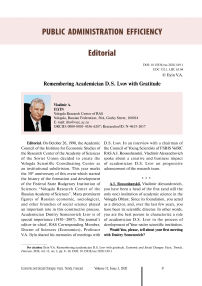Remembering academician D.S. Lvov with gratitude
Автор: Ilyin Vladimir A.
Журнал: Economic and Social Changes: Facts, Trends, Forecast @volnc-esc-en
Рубрика: Public administration efficiency. Editorial
Статья в выпуске: 3 т.13, 2020 года.
Бесплатный доступ
ID: 147224255 Короткий адрес: https://sciup.org/147224255
Текст ред. заметки Remembering academician D.S. Lvov with gratitude
V.A. Ilyin. I would like start with the background of this acquaintance. It is directly related to the initial stages of the formation of VSCC. In December 1993, it was transformed into an independent scientific institution – the Vologda Scientific Coordinating Center – and included into the Economic Department of RAS. In 1996, D.S. Lvov became an academic secretary of this Subdivision. Thus, it is possible to say that I was connected with Dmitry Semenovich by scientific work. Although, even before that, I was familiar with academician D.S. Lvov’s scientific authority. I knew that Dmitry Semenovich had worked in the leading research institutes of the Academy for many years, and, before the position of an academic secretary, he was a deputy director of The Central Economic Mathematical Institute of RAS for several years. Among economists, he was revered as the author of fundamental works on the theory of scientific and technical development, the efficiency of
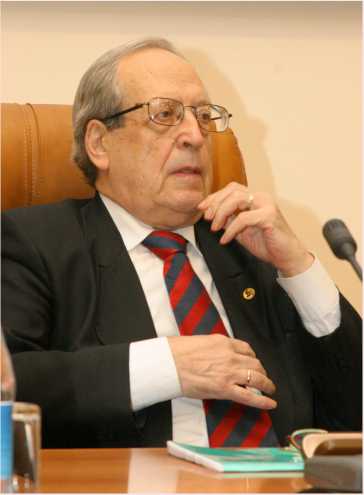
RAS academician Dmitry Semenovich Lvov at the 5th Regional scientific and practical conference “Strategy and tactics of socio-economic reforms: regional aspect”. Vologda, January 25–27, 2006
factors of production and capital investment. In a post-Soviet scientific community, his speeches on efficient mechanisms for the economy’s functioning in the transition period had already received wide resonance. He publicly criticized the targets and methods of market reformation of the Russian economy chosen by the new Russian government.
A.I. Rossoshanskii. What issues were the most discussed ones during the initial period of your professional meetings with academician D.S. Lvov?
V.A. Ilyin. In the mid-90s, as social scientists now say, there was a collapse of radical reforms: after the collapse of the USSR and massive privatization of state property, the country’s powerful post-Soviet production potential was on its way to destruction. Russia was in a deep systemic socio-economic crisis. In 1991–1995, the country’s gross domestic product decreased by nearly 50%, industrial production – by more than 2 times, agricultural production – by 30%, and capital investment decreased by almost 70%. As the result, people’s living standards declined very sharply. In 1995, 37 million people (25% of residents) had incomes below the subsistence level. Similar negative dynamics took place in the Vologda Oblast.
The reasons of this, speaking in detail, were: first, the wrong choice of basic macroeconomic theory reforms which adopted a neoliberal concept – monetarism, based on the theory of self-regulation of the market and minimization of state participation in the economy; second, the implementation of reforms based on mythical theories that private property is always more efficient than state property, and, third, a desire of “reformers” to implement public policy in accordance with these postulates.
Dmitry Semenovich noted with pain that such reasoning is deeply practically inadequate. In mass media and during brilliant public speeches at various forums, he argued that the policy, pursued by domestic liberals, based on the provisions of the so-called Washington consensus, is hopeless for Russia in socio-economic and socio-political terms. Dmitry Semenovich tried to convey his elaborated vision of the fallacy of goals and methods of transformations, being implemented in Russia, to managers and specialists, representatives of science, and all groups of Russian society.
It was a reason for his initiative, announced at our first meetings, to organize a conference “Strategy and tactics of socio-economic reforms: regional aspect” at the Vologda Scientific Coordinating Center in early 1997.
Dmitry Semenovich took an active part in development of the conference program and the content of its plenary and section sessions. He received consent of a number of leading scientists from academic institutes of the Economic Department of RAS to present reports and presentations on program topics at the conference.
It should be especially noted that this event was supported by the Government of the Vologda Oblast.
The conference was held on January 22–24, 1997. At the first plenary session, conducted in a large conference hall of the Government, Dmitry Semenovich presented a deep report with a very bright speech. At the end of the conference, he positively assessed all sessions. It was agreed that Russian conferences on regional aspects of implementing a strategy and tactics of socioeconomic reforms should be held under the auspices of the Economic Department of RAS in Vologda once in two years.
It should be noted that Dmitry Semenovich subsequently (in 2000–2007, he was the head of the Economics section of the Department of Social Sciences of RAS) honored this agreement.
Under his scientific guidance, Russian conferences on aforementioned topics were held in Vologda on March 31–April 3, 1999, January 17–20, 2001, April 2–5, 2003, and January 25–27, 2006. In various years, academicians L.I. Abalkin, A.S. Granberg, V.L. Makarov, V.I. Mayevsky, V.V. Okrepilov, A.I. Tatarkin, and other major scientists engaged in economic, sociological, and other social studies took part and presented reports at these conferences. We may say that academician D.S. Lvov was at the beginning of the scientific discussion platform which now operates on the basis of the Vologda Research Center.
A.I. Rossoshanskii. Vladimir Alexandrovich, please, tell us about the most important ideas that Dmitry Semenovich delivered at these conferences.
V.A. Ilyin. At the first conference, the main point of his speech was the presentation of Russia
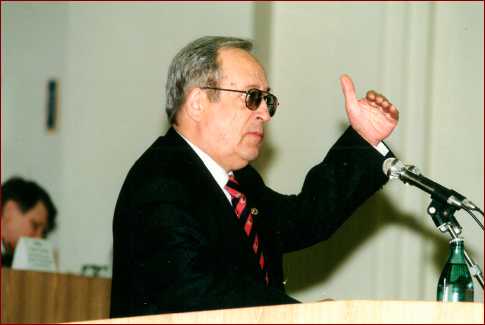
D.S. Lvov at the 2nd Russian scientific and practical conference “Strategy and tactics of socio-economic reforms: regional aspect”.
Vologda, March 31 – April 2, 1999
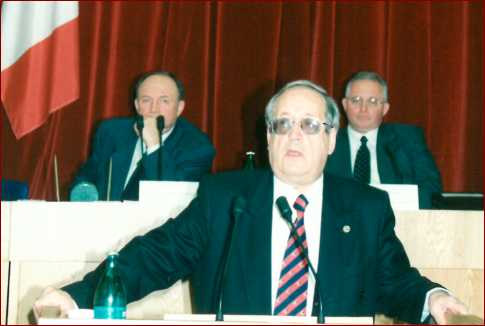
D.S. Lvov at the 3rd Russian scientific and practical conference “Strategy and tactics of implementing socio-economic reforms: regional aspect”. Vologda, January 17–20, 2001
as a huge storehouse of natural resources which was used strategically unsatisfactorily due to the usage of inefficient economic mechanisms. He said that “in a value of the gross product produced in Russia, 75% is accumulated by natural resources, but the treasury receives only a half of real income”. The rest is deducted from the tax system by unscrupulous businesses, various intermediaries, and criminals. Academician convinced the audience that the income from natural resources should belong to everyone. The state should withdraw natural rents from those who became oligarchs during privatization distribution of the country’s natural resources and distribute it among all citizens. He presented the concept of national property management developed under his leadership. Its essence was the need to direct the rent, paid by mining enterprises, to national funds – to finance education, health, and other social needs and requirements.
Dmitry Semenovich’s another fundamental idea was that a main disparity, hindering economic growth and negatively affecting the quality of domestic economy, is an unacceptably low level of employees’ wages in Russia. He cited the following data: in terms of average hourly labor productivity, Russia is behind the United States by nearly 3.6 times, and, in terms of hourly wages in dollar equivalent, it lags behind the United States by 9.6 times. Our salary, as Dmitry Semenovich noted, is low not in general but in relation to our low productivity. Lvov rejected a stereotypical thesis that “we live bad because we work bad” and stated that “in fact, we work bad because we live bad”. He believed that it is necessary to sharply increase salaries, a salary volume should be as close as possible to the level of developed Western countries in terms of its share”.
Unfortunately, his proposals were ignored by Russian authorities at that time, and the economic and social situation in the country deteriorated. In August 1998, a default of virtually unprofessional origin broke out in Russia. In 1999, the government of E.M. Primakov managed to get out of it due to a purely more pragmatic approach and increased prices on the global market of oil and gas resources – main products of Russian exports.
However, this government was soon dismissed by the President B.N. Yeltsin. The country continued to develop mechanisms that did not ensure stable development.
Dmitry Semenovich spoke with pain about negative consequences of this process at conferences, held in Vologda, during his lifetime. His predictions in this regard turned out to be prophetic.

D.S. Lvov at the 4th Russian scientific and practical conference “Strategy and tactics of socio-economic reforms: regional aspect”. Vologda, April 2–5, 2003
Let us look at the dynamics of Russia’s economic and social development over the past twenty years. V.V. Putin, after his first presidential election in 2000, partially seized oligarchs’ natural rents. Together with a monotonous growth of oil and gas prices in 2000–2007, authorities managed to improve the country’s economic situation to a certain extent and significantly increase incomes of main population groups. However, a global economic crisis, which took place in 2008, led to the fact that, in 2009, Russia’s most important economic and social indicators declined more than in other major countries. It was shown by unilateral orientation of the state toward fuel and energy resources’ export, a high pre-crisis inflation, and inefficient financial policy based on monetarist principles. Later, when the crisis’ bottom was behind, necessary drastic changes in activities of authorities did not occur. After that, the situation began to change for the worse even faster. The growth of the country’s GDP in 2017– 2019 was 1–2%. Since 2014, the population’s real incomes have been declining. At the same time, welfare of a relatively narrow group of oligarchs and large entrepreneurs grows. Additional difficulties for development of our economy are created by American and European anti-Russian sanctions related to the return of the Crimea by Russia. The coronavirus epidemic has brought us serious losses.
The need for a sharp increase of the level and quality of public administration, a significant adjustment of the current political course and applied economic mechanisms becomes more relevant.
A.I. Rossoshanskii. Vladimir Alexandrovich, what are the most important and currently relevant lessons of D.S. Lvov?
V.A. Ilyin. Dmitry Semenovich expressed his views and proposals on development of our country in his works of the 2000s in the most concentrated way. Among them, I would like to highlight “Economic Manifesto: Future of the Russian Economy” (2000), “Economic
Development and Challenges of Economic Science” (2001), “Development Economics” (2002), “Economic Growth and the Economic Quality” (2004), “Moral Economy” (2004), “Russia: Framework of Reality and Contours of Future” (2007). A list of his remarkable and relevant scientific works is, of course, much longer.
Expressing deep concerns about the results of economic reforms in Russia, he wrote and said: “our trouble is that, in practice, many elements and mechanisms of the economic system, which are focused on ensuring humanistic ideals, were crossed out and discarded. Although the
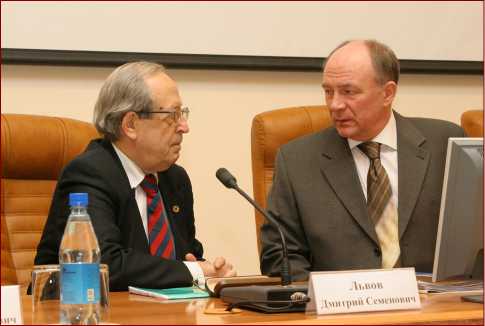
D.S. Lvov (on the left) and the Governor of the Vologda Oblast (1996—2011) V.E. Pozgalev. Vologda, January 25–27, 2006
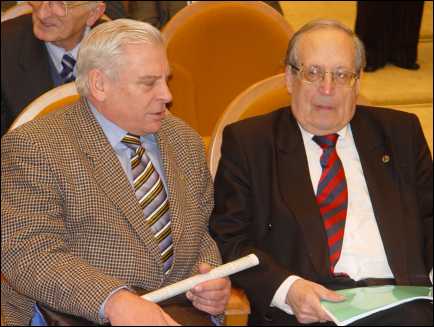
Academicians D.S. Lvov (on the right) and A.I. Tatarkin at the 5th Regional scientific and practical conference “Strategy and tactics of socio-economic reforms: regional aspect”. Vologda, January 25–27, 2006
Constitution of the Russian Federation, as noted by Dmitry Semenovich, includes values of a socially-oriented, legal state, a real situation severely contradicts it. There is a collapse of the system of social guarantees and the expansion of social polarization”.
D.S. Lvov formulated the main criteria for assessing a degree of a long-term social development. He highlighted that “ we must clearly declare that our goal will be the economy with a main driving force that is fundamentally different from a market society of mass consumption. Instead of aspirations for wealth and its symbolic manifestations, there should be an aspiration toward a high quality of life . This quality cannot be achieved individually, without a simultaneous improvement of others’ quality of life. In other words, the quality of life of a society should be determined by a variety of life benefits that can be guaranteed to each of its members, including a benefit to work not just for earning money. A benefit of personal time, free from work for the sake of earning money, too. This guaranteed package should ultimately measure the quality of the economy ”.
A.I. Rossoshanskii. During his travels to Vologda to visit scientific events, did Dmitry
Members of the Economic section of the Department of Social Sciences of RAS and directors of RAS economic institutions, headed by D.S. Lvov, visit enterprises of the Vologda Oblast
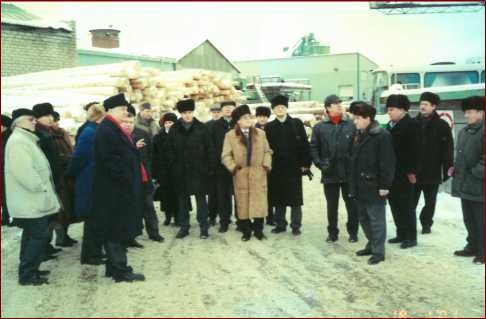
OAO “Sokol’skiy DOK”, Sokol, January 17–20, 2001
Semenovich find time to get acquainted with activities of specific enterprises and to view historical and cultural monuments of the Vologda Oblast?
V.A. Ilyin. He considered it a necessary part of his visits. First of all, he was interested in the situation with the production of innovative products at enterprises. Dmitry Semenovich several times visited opto-mechanical and bearing plants, the Dairy Farming Academy, the Cherepovets Metallurgical Combine, and a number of other industries that introduce new technologies and equipment. At the same time, he objectively assessed what he saw and made meaningful recommendations for improving these activities. And, of course, as a highly
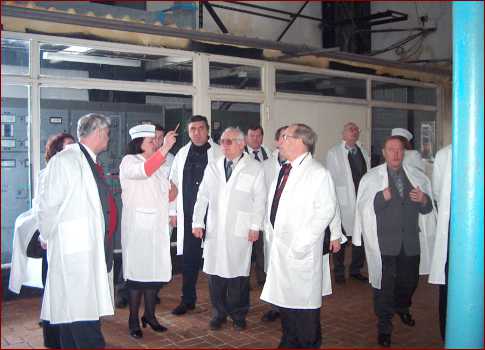
OAO “Severnoe moloko”, Gryazovets, April 2, 2003
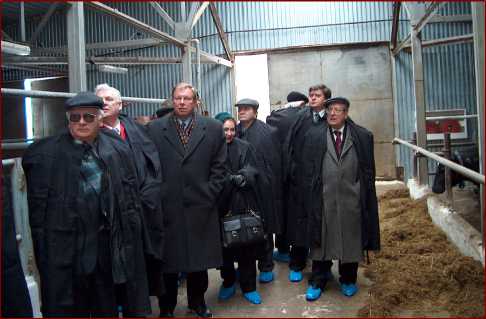
ZAO Plemzavod “Zarya”, Vologda region, April 2, 2003
spiritual person, he was interested in the history of our Northern region, recreated in the Vologda museums.
He was particularly impressed by his visit to the Kirillo-Belozersky Monastery – the center of spiritual life in the Russian North. Dmitry Semenovich attached great importance to meetings with regional heads and the heads of the regional center. During these meetings, he basically studied the state and level of efficiency of regional and municipal government bodies.
A.I. Rossoshanskii. How did Dmitry Semenovich’s regular participation in scientific and practical conferences, your meetings, and professional contacts with him influence subsequent activities of the Vologda Research Center?
V.A. Ilyin. A role of D.S. Lvov for our team was a very significant in a long-term perspective.
His personal participation in events, conducted at our Center, contributed to the growing fame of our team. To say frankly, the authority of the heads of the institution increased. And, most importantly, our researchers’ positions in the community of Russian scientists and economists were consolidated.
Dmitry Semenovich’s presence at scientific events in the Vologda Oblast attracted the participation of the heads and renowned researchers of academic economic institutions of Moscow, St. Petersburg, Yekaterinburg, the Murmansk Oblast, Komi and Karelia Republics, and other Russian regions. Because of this, mutual scientific contacts were established and developed, and research experience was exchanged. Now, these relationships have become even more meaningful and creative.
I would also like to emphasize that Dmitry Semenovich’s ideas became a foundation for the formation of a promising research topic for our team’s works. These include, first of all, scientific products related to the study of ways to improve the population’s quality of life in regional and national aspects, to advance a level of public administration, rational construction of the budget system. The relevance of this topic played a very significant role in increasing a number of candidate and doctoral theses defended by our employees.
During his visits, Dmitry Semenovich expressed satisfaction with the fact that young people constantly join our research center. He believed that it is impossible to accelerate development of the country without turning to the knowledge economy, where the results of
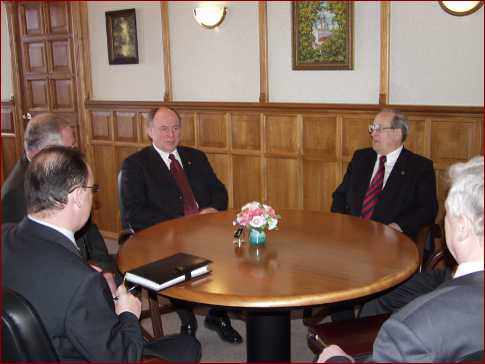
D.S. Lvov’s meeting with the heads of the Oblast and the Oblast’s center. Vologda, April 4, 2003
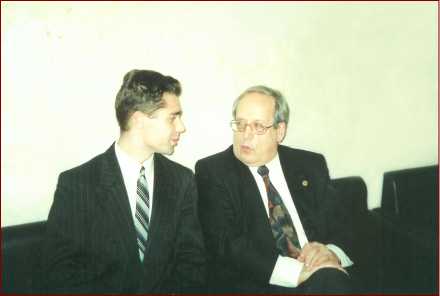
3rd Russian scientific and practical conference “Strategy and tactics of socio-economic reforms: regional aspect”. Vologda, January 17–20, 2001. D.S. Lvov talks with a postgraduate student of VSCC D.N. Kozhin (currently, D.N. Kozhin is the head of the Department of education quality management and innovative technologies in the Vologda Institute of Law and Economics, Lt. Colonel of the internal service)
activities of scientists, specialists, and innovators are of primary value. He sais that “the whole system of the social structure should be aimed at strengthening a role and importance of creators of new knowledge, technologies, products, and services that fundamentally change the direction of formation and structure of the usage of national income”.
I would like to note another fundamental feature of Dmitry Semenovich as a scientist: a systematic approach was natural for him. He constantly emphasized that the results of the country’ s socio-economic development as a whole consist of the results of activities of its regions, which are very diverse in terms of resources and usage conditions in Russia.
This insight was clearly reflected in his views and actions in the field of organizational structure of economic science institutions. He considered it necessary to increase a spatial scale of economic studies and provided constant assistance to development of economic institutions of RAS located in Russian regions. In reports on activities of the Economic Department of RAS, there was the expansion of the representation of the most significant works performed by noncapital institutions on development of socioeconomic policies and efficient functioning of Russian territorial systems. This list also included achievements of Vologda scientists. It was a peculiar assessment of positive qualitative developments in activities of economic science structures, operating in specific conditions that develop in certain federal districts, republics, krais, and oblasts of Russia.
D.S. Lvov was not a cabinet scientist. Throughout his life, he lectured students and participated in educational programs on radio and television. He presented his vision of current and upcoming challenges of Russia’s development at meetings of the national parliament’s chambers, the Russian government, ministries, and departments.
Dmitry Semenovich was a remarkable speaker, who showed his intellectual wealth in his speeches. He had a striking ability to attract like-minded people. Most listeners of his public speeches momentarily turned into his spiritual supporters.
In February 2020, the 90th anniversary of academician’s birth was held. In July, it will be 13 years since his death. However, Dmitry Semenovich’s scientific statements and conclusions about the content of the strategy and tactics of socio-economic transformations in Russia become more relevant and practical.
I. Rossoshanskii. Vladimir Alexandrovich, thank you for this interview about an outstanding scientist and a remarkable man who played a significant role in the formation of the Vologda Research Center of the Russian Academy of Sciences. VolRC RAS, primarily following D.S. Lvov’s principles, is currently among the scientific leaders of the Russian Federation.

